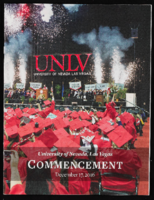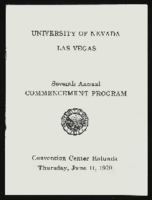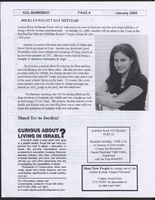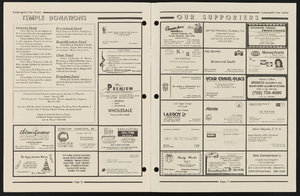Search the Special Collections and Archives Portal
Search Results

University of Nevada, Las Vegas (UNLV) Fall 2016 commencement program
Date
Archival Collection
Description
Commencement program from University of Nevada, Las Vegas Commencement Programs and Graduation Lists (UA-00115).
Text

University of Nevada, Las Vegas (UNLV) 7th commencement program
Date
Archival Collection
Description
Commencement program from University of Nevada, Las Vegas Commencement Programs and Graduation Lists (UA-00115).
Text

Transcript of interview with George Pollak by Claytee White, May 25, 2010
Date
Archival Collection
Description
George was raised in Mattapan, a suburb of Boston, by his mother and father. George had four siblings and was the second youngest. George shares fond memories of growing up and playing softball and tennis in the neighborhood park with his numerous friends. George could listen to a song on the radio and play it on the piano by ear when he was as young as four years old. George had several jobs to earn money growing up, including working in a record store and as a busboy. Eventually George and his brother joined a trio with Steve Harrington and performed in clubs. In 1958, George joined his brother and Paulette Richards in Las Vegas where they had a contract to play at El Rancho Hotel & Casino where they played until it was destroyed by fire. Following the fire, George and his brother parted ways and each did their own thing. In the 1960s, George began playing with the band at Caesars Palace. George used his background in accounting to do some bookkeeping and payroll for some of the ban
Text

Transcript of interview with Richard Leigon by Stefani Evans and Claytee White, January 12, 2017
Date
Archival Collection
Description
The first part of this Shakespearean quote perfectly describes the deep admiration and love that Richard Leigon has for his father, International Brotherhood of Electrical Workers (IBEW) leader Ralph Leigon. The elder Leigon's major contributions include 39 various positions from the Nevada State American Federation of Labor and Congress of Industrial Organizations (AFL-CIO), Nevada State Democratic Party, and the Southern Nevada Building Trades Council. Richard speaks upon the early years of Las Vegas with the allure of atomic testing, going to school with future community leaders Jerome Mack, Shelley (Levine) Berkeley, and Beth Molasky as well as the role of the union in building Las Vegas. After graduating from Las Vegas High School, he attended Somona State University and obtained a degree in humanistic psychology where he furthered his father’s influence on becoming a ‘we’ person. He came back to Las Vegas to start his 40-year career as an active member of Local 357 as executive
Text

Transcript of interview with Ellis Landau by Barbara Tabach, November 28, 2017
Date
Archival Collection
Description
In 1990, Las Vegas became home to Ellis Landau and his attorney wife, Yvette. They moved from Phoenix, Arizona when Ellis accepted a position as Executive Vice President and Chief Financial Officer with Boyd Gaming. The relocation also included a desire to become active in the local community. Temple Beth Sholom was one of their first connections. For Ellis the Jewish community of a newer city like Las Vegas differed immensely from his childhood upbringing in a more ethnic Jewish community outside Philadelphia. Nevertheless, Ellis soon became active on the Temple Beth Sholom board, and is a past Treasurer and President. The couple are among the founders of the Warsaw Memorial Garden at the synagogue. In 2006, Ellis was honored as Temple Beth Sholom’s “Man of the Year.” The Landaus have been significantly involved with other local organizations such as Nathan Adelson Hospice and the Las Vegas Philharmonic. Ellis’s dedication to the Anti-defamation League, both on a local and regional level, is a beacon of inspiration to others. The Landaus are sponsors of ADL’s “No Place for Hate” program. Ellis is a graduate of Brandeis University in economics and has a Masters of Business Administration from Columbia University School of Business. His former career steps include Ramada Inc. and U-Haul Corporation.
Text

Transcript of interview with Irwin Molasky by David G. Schwartz, April 23, 2014
Date
Archival Collection
Description
Interview with Irwin Molasky by David G. Schwartz, April 23, 2014. In this interview, Irwin Molasky discusses arriving in Las Vegas in the 1950s, and building the Pyramids motel on the Strip. He talks about the entertainers in various hotels on the Strip, the concept of the "star policy," and bringing Parisian shows to Las Vegas. He goes on to discuss his real estate developments, including Paradise Palms, Boulevard Mall, and Sunrise Hospital, and donating the land for the development of UNLV.
Irwin Molasky came to Las Vegas in 1951, during a time when "everyone knew everyone else," and there was a small, but strong Jewish community. An Army veteran, Irwin and his wife moved to Las Vegas after living in California for a short time. Irwin soon built The Pyramids, a Strip motel next to the Flamingo Hotel and Casino. The Pyramids opened the same day as its northern next-door neighbor, The Sands Hotel and Casino, on December 15, 1952. Irwin used his newly acquired contractor's license to become on the city's most important real estate developers. Over the next 60 years, he built everything from residential housing, including Paradise Palms to commercial properties. Projects included Sunrise Hospital and the surrounding medical buildings; Sunrise City Shopping Center and other power centers; Bank of America Plaza and much other downtown development; and golf courses. When the recession hit, Irwin began bidding on government projects across the country, successfully shielding his business and employees from the economic downturn. Irwin's real estate ventures not only had a tremendous impact on Las Vegas' economic development, but a substantial effect in social programming. Irwin donated 40 acres of prime real estate to the University of Nevada - Las Vegas (UNLV) so that university could expand. Additionally, he was the Founding Chairman of the UNLV Foundation and received an honorary doctorate in humanities.
Text




